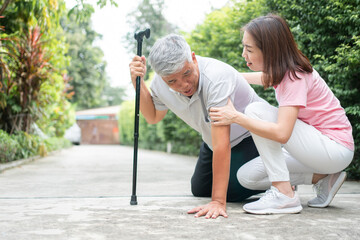
Slip and fall accidents can be minor or severe depending on the details of the circumstances. Regardless of the severity of injuries sustained, if you were hurt in a slip and fall it is important that you determine who is liable for paying the associated medical bills. For more information and to obtain skilled representation, reach out to an experienced Pike County, KY premises liability lawyer today.
What Injuries Are Commonly Sustained in a Slip and Fall?
Every slip and fall accident is unique so there is no telling exactly what injury an individual may sustain. These types of accidents can result in a wide range of injuries, varying from minor to extremely severe. Many factors affect the type or severity of the injuries in a slip and fall like the individual’s age and health, the surface they fell on, the distance they fell, and more.
Common injuries sustained in a slip and fall accident include the following.
- Bruises
- Contusions
- Lacerations
- Sprains
- Strains
- Fractures
- Broken bones
- Concussions
- TBIs (traumatic brain injuries)
- Spinal cord injuries
While victims may walk away from a slip and fall relatively unharmed, there is always the potential that injuries sustained in a fall will be life-threatening or even fatal. Because of the wide range of injuries that can be sustained, it is important to understand how medical expenses can be covered.
Who is Liable for Medical Bills After a Slip and Fall Accident?
The individual or entity liable for covering medical bills after a slip and fall accident varies depending on the details and circumstances surrounding the event. If the injured party was reckless in their behavior or the accident was their own fault then their health insurance will generally be used to pay for the associated expenses. Individuals can obtain health insurance through their job, relative, spouse, or through a private provider. The insurance company will typically cover the majority of the bills though the individual may be required to pay copays or deductibles.
If, however, the accident was someone else’s fault, the negligent party may be required to pay. For example, property owners are legally responsible for accidents and injuries that occur on their property under premises liability law. If a property owner was negligent in the maintenance and care of their property and a hazard caused the slip and fall, the victim could pursue compensation through the individual. Property owners usually have liability insurance that can cover the costs, otherwise, the victim could file a personal injury lawsuit for damages.
Additionally, if the individual slips and falls while at work, they may be able to collect compensation for their medical bills through their employer. Certain companies are required to carry insurance for employees, known as workers’ compensation. Through this insurance, employees can collect damages for their medical expenses as well as lost income from time taken off work to recover.
To learn more about which of the above applies to your case, contact a knowledgeable attorney today.
